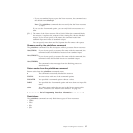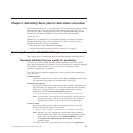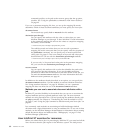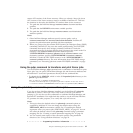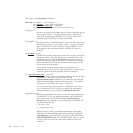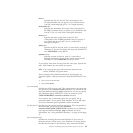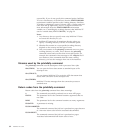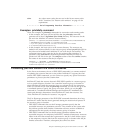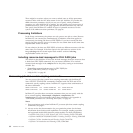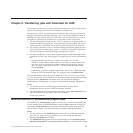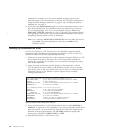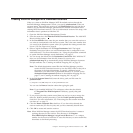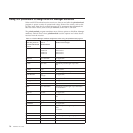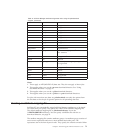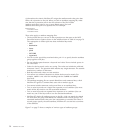
other Any other return codes that are not in this list are return codes
from C functions. See “Return code numbers” on page 113 for
explanations.
+ — — — — — – — End of Programming Interface information — — — — — - — +
Examples: pdxtx2afp command
These are examples of pdxtx2afp commands for conversion and scanning tasks:
v In this example, the Xerox job and all files that the pdxtx2afp command
generates are in the C:\Inputdata\Jobs\51230 directory. The resources for the
job are in the InfoPrint XT common resource library:
pdxtx2afp -i C:\Inputdata\Jobs\51230\103355000 -o C:\Inputdata\Jobs\51230\103355000.afp
-r %PDXTWORKDIR%\resources\common -w C:Inputdata\Jobs\51230
-x "xjdl=lbb xjde=pay xcc=machine xclb=none xrecfm=variable xlrecl=32760"
2> C:\Inputdata\Jobs\51230\conversion.log
v In this example, the Xerox job is in the current directory. The resources are
loaded in the resource library for the resource group named payroll (the JDL for
the job must be loaded before InfoPrint XT can scan the job successfully). The
conversion process only scans the job for the resources that it requires, as
specified by the xconvert=no conversion parameter. InfoPrint XT does not
produce an AFP file for the job. The x2afp.lst section of the file scanlist contains
the names of the resources that the job requires:
pdxtx2afp -i .\103355000 -r %PDXTWORKDIR%\resources\payroll
-x "xjdl=lbb xjde=pay xcc=machine xclb=none xrecfm=variable xlrecl=32760
xconvert=no xafprc=12" 2> .\scanlist
Processing jobs that contain FILE DJDE commands
In the Xerox environment, the use of FILE DJDE commands is a common method
of updating the resources that are on the printer. InfoPrint XT supports jobs that
include FILE DJDE commands; you do not have to specify any special conversion
parameters to process jobs that contain them.
InfoPrint XT loads the resource that each FILE DJDE specifies in a resource group
or in a specific directory location. You control the resource group or location in
which InfoPrint XT loads the resources when you submit the job for conversion.
When you submit the job with the pdxtx2afp command, you can use the -g or the
-r command option to specify the group or location. When you use the pdpr
command in a combined InfoPrint Manager and InfoPrint XT installation, the
search-path hierarchy determines where InfoPrint XT loads the resources. See
“How InfoPrint XT searches for resources” on page 60.
The P or D storage parameter of the FILE DJDE command determines how long
InfoPrint XT retains the files that it generates during the resource-load process in
the resource group or location:
v FILE DJDE commands that use the P storage parameter specify that the
associated resources are permanent resources. They remain on the system after
the job that specifies them finishes. Permanent resources are then available to
subsequent jobs that specify the same resource group or location.
v FILE DJDE commands that use the D storage parameter indicate that the
associated resources are temporary. InfoPrint XT embeds all temporary resources
inline in the AFP data stream that it generates for the job. It then deletes copies
of the temporary resource files from the resource group or location after the job
finishes conversion. Therefore, subsequent jobs cannot use them.
Chapter 5. Submitting Xerox jobs for data stream conversion 65



